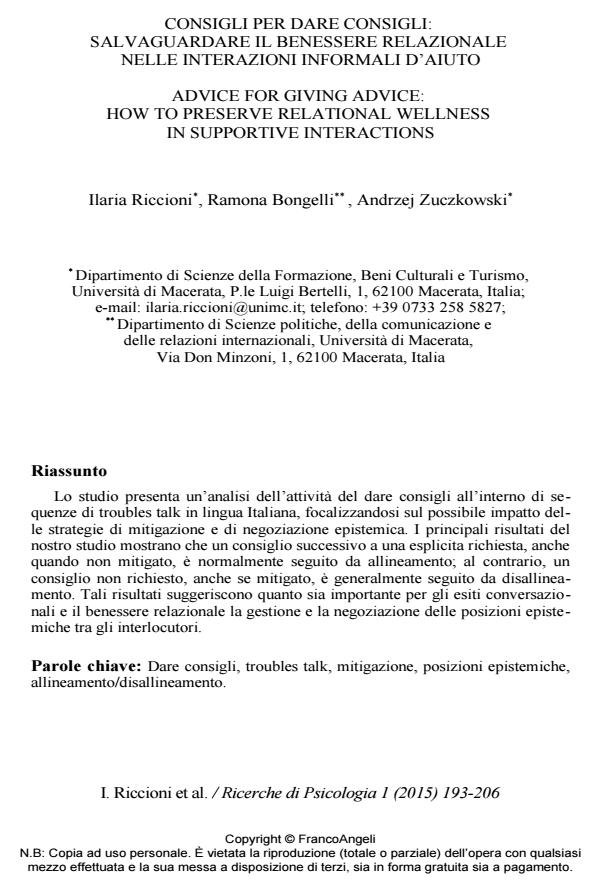Consigli per dare consigli: salvaguardare il benessere relazionale nelle interazioni informali d’aiuto
Titolo Rivista RICERCHE DI PSICOLOGIA
Autori/Curatori Ilaria Riccioni, Ramona Bongelli, Andrzej Zuczkowski
Anno di pubblicazione 2015 Fascicolo 2015/1
Lingua Italiano Numero pagine 14 P. 193-206 Dimensione file 216 KB
DOI 10.3280/RIP2015-001012
Il DOI è il codice a barre della proprietà intellettuale: per saperne di più
clicca qui
Qui sotto puoi vedere in anteprima la prima pagina di questo articolo.
Se questo articolo ti interessa, lo puoi acquistare (e scaricare in formato pdf) seguendo le facili indicazioni per acquistare il download credit. Acquista Download Credits per scaricare questo Articolo in formato PDF

FrancoAngeli è membro della Publishers International Linking Association, Inc (PILA), associazione indipendente e non profit per facilitare (attraverso i servizi tecnologici implementati da CrossRef.org) l’accesso degli studiosi ai contenuti digitali nelle pubblicazioni professionali e scientifiche.
Lo studio presenta un’analisi dell’attivita del dare consigli all’interno di sequenze di troubles talk in lingua Italiana, focalizzandosi sul possibile impatto delle strategie di mitigazione e di negoziazione epistemica. I principali risultati del nostro studio mostrano che un consiglio successivo a una esplicita richiesta, anche quando non mitigato, e normalmente seguito da allineamento; al contrario, un consiglio non richiesto, anche se mitigato, e generalmente seguito da disallineamento. Tali risultati suggeriscono quanto sia importante per gli esiti conversazionali e il benessere relazionale la gestione e la negoziazione delle posizioni epistemiche tra gli interlocutori.
Parole chiave:Dare consigli, troubles talk, mitigazione, posizioni epistemiche, allineamento/disallineamento.
Ilaria Riccioni, Ramona Bongelli, Andrzej Zuczkowski, Consigli per dare consigli: salvaguardare il benessere relazionale nelle interazioni informali d’aiuto in "RICERCHE DI PSICOLOGIA " 1/2015, pp 193-206, DOI: 10.3280/RIP2015-001012